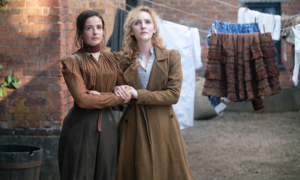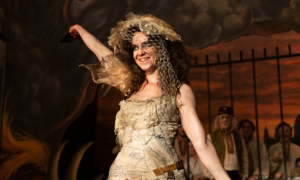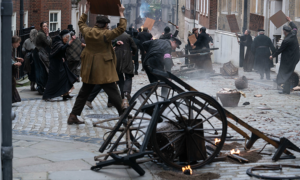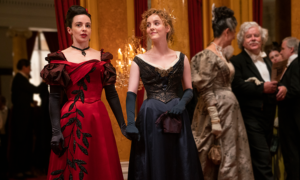Set in Victorian London, The Nevers sees the population rocked to its foundations by a supernatural event which gives certain people — mostly women — abnormal abilities, from the wondrous to the disturbing. But no matter their particular ‘turns’ all who belong to this new underclass are in grave danger.
It falls to mysterious, quick-fisted widow Amalia True (Laura Donnelly) and brilliant young inventor Penance Adair (Ann Skelly) to protect and shelter these gifted ‘orphans’. To do so, they will have to face the brutal forces determined to annihilate their kind, the ‘touched’.
However, not all of ‘touched’ use their turns for good. Amalia and Penance must also face some of their own kind, including the tortured and murderous, Maladie (Amy Manson, above) who runs an anarchist gang. Her infamous vile acts shock London to the core but as we discover more about Maladie, we find out she’s not quite what she seems. Has her past in a mental asylum caused her to murder? And what is her mysterious connection to Amalia?
We sat down with star Amy Manson to discuss playing the emotionally complex character, the feminist undertones of The Nevers and making such an impressive entrance!

How did you first hear of the part of Maladie in The Nevers?
My agent got in touch and said there’s this fantastic TV show, the most amazing character and do I want to go in for it? As soon as I read the script I was like ‘what is this?’, I just couldn’t fathom, one how huge this [TV show] was, and two, I couldn’t fathom her. I just couldn’t work Maladie out. Also, for audition purposes, the character was called Mabel…
So I just kind of picked this scene apart for a few weeks, and then went in for the audition. Then I got a callback to meet [producer] Joss [Whedon] and the casting agent, and proceeded to tell him what I thought of the scene, and he was just like: “Nope, it doesn’t mean any of that. I wrote it in five minutes!” So, then I performed for him and then that was the start of, probably the best journey, of my life.
What were your first thoughts on Maladie? She certainly doesn’t act like a ‘Mabel’!
I know! I was watching A Woman Under the Influence the other day, and the title character is called Mabel, so I thought, ‘oh, is there a reference there?’ There has to be a reference somewhere because Joss just wouldn’t call her Mabel for any reason!
The blurb [for Maladie] was along the lines of ‘she speaks in jibes and riddles and she’s a bedlam waif’. Whereas for me, sometimes I think maybe there’s a lost little girl in all of us and she’s suppressing such pain. I wanted to rely on what she’d gone through to give her truth, and for it not to become just a one-note performance.
Everybody has a combination of past experiences and it was just trying to pick apart hers. In an era when a lot of people were living in such severe poverty and awful sanitary conditions, I was just trying to piece all things together. Was she an orphan? Did her mum die in childbirth? All these sorts of things to make her who she is and then also to realise the pain that she’s gone through at the hands of these doctors at a time where women didn’t really have a voice. That was really intriguing for me. She’s just such a battle axe and she doesn’t take any prisoners!
How did you go about developing such a complex character? Did you create a history for her?
Yeah, I absolutely did. I took her back to base level. I would take her back to what it felt like to be a child, maybe losing my mum I think I decided in childbirth and becoming an orphan and to maybe be sent to work at a young age. All she wants to do is watch these beautiful Victorian women walk around the streets and want to be that. The desire to live that life.
You’re given all the relevant information about a character in a good script, and that’s what this was. What people say about her, what she says about other people, her opinion on other people. It’s a massive minefield of picking apart and then going into her behaviours and through the trauma.
What jumped out at you when you first read the script for The Nevers?
The quality of the writing. Absolutely. I still don’t think a lot of the cast and crew know what’s happening. There’s just so much going on and every episode just opens up another kind of vortex and faction of what we’re all involved in. It just opens up a whole other realm almost of possibilities. But episode one, I think I must have the best entrance a character’s ever had on TV. That stole it for me!
Yes, your entrance is brilliant! It’s a scene where you have a long monologue while on a stage, what was it like shooting it?
That was the first thing that I shot! It was really great. Joss was so giving of time. He does a lot of rehearsals pre-filming, so on the day we’re not spending time working it out, we’re just experimenting and trying different ways.
Because I pop in at the end of episode one, he’d spent a lot of time with the other characters, so he was very giving of his time with me and saying: “If you want to just speak for an hour, throw ideas at me, feel free to get in touch.” It was very much a collaborative journey for me, and I had time to work on that. I’d done a few stage plays, so it just felt like I was on stage but also Joss was like ‘you need to be free enough to do what you want, it needs to be that rooted and you just need to understand there’s so much that you can be free on stage’, and I felt that.
She’s just a rule breaker and not everybody’s nasty, I think the world can turn you. It was such a gift to have almost two characters: pre-asylum and post asylum. For me, Maladie just resented the fearful person that she used to be. So I just wanted it to be big and bold, and for her to be enjoying this performance and enjoying the fact that she knows that she could just obliterate everybody in the audience right there and then. Just to have fun with that and that’s what I hope to do going forward, just to enjoy the process of where she is.

How would you describe ‘the touched’ and Maladie’s role as one of them?
The touched are predominantly females of a lesser class in society. Maladie is the head of the anarchists basically [while] Amalia is the head of a team of touched who are helping out within an orphanage because they’re being cast out of society.
The touched are basically women that accumulate these special powers and we still don’t know, as a cast, why these women were chosen. There’s obviously some bigger entity or something else out there in the universe that has given us the powers. That’s [one of] Maladie’s missions. She thinks she’s been chosen by God. She thinks she’s got the most powerful power, and she wants to know why she’s been chosen. She’s two missions: one to figure out why she’s been chosen by God, and then number two, what this turn is and what these special abilities mean.
The set designs for Victorian London are amazing! Where did you shoot The Nevers?
That’s all down to Gemma Jackson the amazing production designer. HBO bought studios in Ealing. I think it was an old John Lewis warehouse actually and turned that into three floors of sets. Hair and makeup and costume shared the top floor, and then it’s two or three floors of sets. They built actual streets. A lot of the streets that you see are Gemma Jackson and her crew building them outside. They look amazing.
Is there much CGI used in the show as well?
There is. The reason is that unfortunately when COVID hit, we had to cease production and we were just about to start a big scene. A big storyline in episode five, which would have needed about 1000 extras. It just went from this huge spectacle, basically down to little close ups with a lot of CGI. So that’s a shame but hopefully it’ll all read!

How long were you shut down because of COVID?
We were shut down for a few months, not because of COVID, but just to accumulate more scripts. HBO just wanted evidence of more scripts and that there was more story coming. We started back again, and unfortunately if we hadn’t stopped, we would have had these six episodes about a year ago! Then the second wave was coming, so we actually stopped production in November last year, and we’re not picking up the second half of the season until June. That was always the case for us, which I think was a really smart decision.
The first six episodes of The Nevers are ‘part one’. Will there be a part two and when will that be?
So it was only supposed to be ten episodes as HBO are known for. Then I think during COVID it was Joss’ decision to add an extra two because it’s actually a really good stopping point. It stops at episode six and we’re going to pick up episodes seven to 12 from June this year.
Part one is out in the states on the 11 April, and then it’s over here [in the UK] on Sky and Now TV channels on the 17 May.
Seeing as all of the episodes are being dropped on Sky and Now TV in one go, would you say this is a good show to binge or to take your time with?
I think savour it, week on week. I just love HBO shows, but I love it because there’s just so much to normally take in. They create worlds. Westworld was just like… I almost needed to watch it twice! By the time I’d understood what happened over that week it was number two. It’s good TV and it goes too quickly, you’re like ‘oh no, I don’t want that to finish!’
We felt that the series had a feminist undertone…
That comes up a lot and Joss is a feminist so it comes up a lot in his writing. I think he’s showing empowerment and unity through these disabilities. I use that word because that’s the word that society uses. Of course, no two afflictions are the same and we’ll come to realise that as the series goes further.
As an audience it’s hard to see [the touched] enjoy their abilities because they’re still figuring it out. You see it in the first few episodes we all band together and they’re all trying to help one another out and just bolster each other. Because some of the afflictions are kind of abnormalities and you can’t see them. So in that respect it’s nice to watch the women support women, for sure.

What do you want audiences to take away from The Nevers?
I think I would want them to follow the underdog and live in hope. I don’t think you can define this show, I wouldn’t want to even try to. Half of us are still like ‘what is this?’, but that’s the beauty of it. There’s just so many genres and themes. I thought the time period might be quite stifling but it’s not. It has a huge scope, especially Penance’s character, just to delve into the industrial side of the end of the Industrial Revolution…
What’s next for you?
I’ve nearly finished a film called Spencer. Steven Knight wrote it, who does Peaky Blinders, and Kristen Stewart plays Princess Diana. It’s not like anything that we’ve seen film-wise. It’s nothing like The Crown. It’s Knight’s take on what he thinks Diana went through in her life…
All six episodes of part one of The Nevers can now be seen on Sky and on Now TV. Find out more about the series here.
